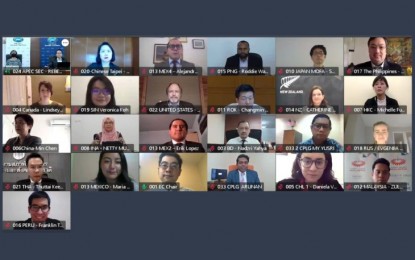
ECONOMIC RECOVERY. APEC Economic Committee virtual meeting discussed some structural reform efforts in a bid to accelerate post-pandemic economic recovery and improve resiliency. The APEC region’s economic growth is currently projected to decline by 3.7 percent in 2020, thereby bringing the total output loss to a staggering USD2.9 trillion. (HO-APEC Secretariat)
JAKARTA – Economic experts and officials from Asia-Pacific Economic Cooperation (APEC) member economies are pressing ahead with structural reform efforts to expedite post-pandemic economic recovery and enhance resilience.
"Advancing structural reform has been an ongoing concern for APEC in its mission to advance economic prosperity. This has improved the business climate and increased economic opportunities," James Ding, chair of the APEC Economic Committee, said in a written statement issued by the APEC Secretariat and received here on Monday.
Ding said the pandemic has driven policymakers around the APEC region to further expedite structural reform efforts to support economic recovery and facilitate people and businesses to get back on their feet.
The APEC region’s economic growth is currently projected to decline by 3.7 percent in 2020, thereby bringing the total output loss to a staggering USD2.9 trillion.
APEC member economies have been swift in rolling out significant and targeted fiscal measures, ranging from one percent to 20 percent of the gross domestic product (GDP) to address the impact of the coronavirus disease 2019 (Covid-19 pandemic).
Despite this unprecedented stimulus in response to economic losses, the crisis continues unabated.
"With more businesses facing the threat of permanent closure, unemployment numbers rising, and health risks still high, we need to quickly improve our current policies and regulations, especially those related to healthcare systems, social protection, the ease of doing business, and inclusive growth," Ding remarked.
Advancing the digital economy to empower businesses and communities in these challenging times has been the focus across the region.
At a virtual meeting last week, experts shared details on their steps in facilitating work in the digital economy, including by addressing issues around competition infringement and competition law as well as boosting the economic and legal infrastructure and regulatory reform.
"In the past few months, we have experienced the importance of connectivity and now fully comprehend the criticality of a successful digital economy. We need to ensure that when we advance the digital economy agenda, we also build capacity and infrastructure while also narrowing the digital divide," Executive Director of the APEC Secretariat Rebecca Sta Maria said.
"Thus, we can encourage the inclusive participation of all members of society in our economy, including those that are vulnerable," she said.
APEC members also reviewed the progress made toward promoting more open, well-functioning, transparent, and competitive markets as well as deepening participation by all segments of society and sustainable social policies.
"This pandemic has presented an opportunity to develop a long-term reform agenda that will improve members’ resiliency towards any emergencies in future," Ding added.
Under the Renewed APEC Agenda for Structural Reform mandate, member economies have been working toward a robust, comprehensive, and ambitious agenda to reduce inequality and stimulate growth since 2015. The mandate will expire at the end of 2020.
APEC economic members are currently reviewing the final report of progress and planning for the next structural reform agenda beyond 2020. (ANTARA)
